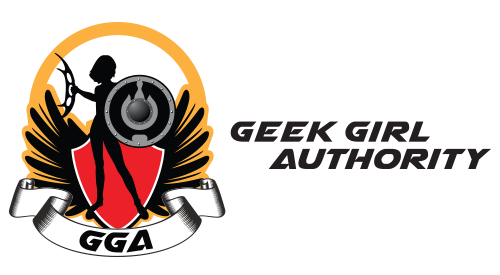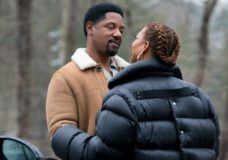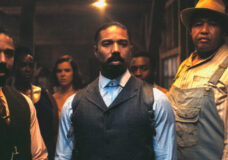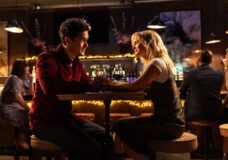Welcome to this week’s installment of Geek Girl Authority Indigenerd Wire, wherein we shine a spotlight on the indigenous people in pop culture. This bi-monthly column will feature the people, shows, movies, art, books and general discussions that celebrate the progress of indigenous perspectives in mainstream pop culture and STEM.
Kawennáhere Devery Jacobs, Mohawk, was born and raised on the Mohawk reservation in Kahnawake, Quebec, Canada. Jacobs did some community acting as a young girl with the Turtle Island Theater company in Montreal. When Jacobs was ten, her mother signed her with an agency leading to her first local feature at the age of thirteen. Since most of the local projects were spoken in French and native roles were nonexistent, Jacobs turned to her second career choice to become a social worker.
It was while she was in school and working at a native women’s shelter that she was cast in her first leading role. She played Aila in Jeff Barnaby‘s Rhymes for Young Ghouls. That role earned her a nomination for Best Performance by an Actress in a Leading Role in the 2014 Canadian Screen Awards.
Jacobs is currently starring in the Netflix series The Order as Lilith Bathory and appeared in episode 3 of American Gods as Sam Black Crow. She’s been a star in Indian Country since Rhymes for Young Ghouls and now the world is discovering her talent in front and behind the camera. I was excited to talk to Devery about her career, her newfound fame and the state of Indigenous representation in film and television.
**Spoilers for The Order ahead**
Getting Started
Noetta Harjo: Hi Devery! How are you?
Devery Jacobs: I’m pretty good.
NH: I bet you’re on a high after the American Gods episode aired right?
DJ: Oh yeah, it’s been a, it’s been pretty great. I actually came back to my rez to watch it. I’m down here in Kanien’kehá:ka territory with my family and we all like squished together on the couch and it was pretty awesome.

NH: I was excited to see you on such a big production. I’ve actually followed your career since Rhymes for Young Ghouls.
DJ: Oh Wow! That’s been a while.
NH: Yeah, I saw it at a little film festival here called Native Crossroads.
DJ: I know it and I’ve been, I think it was two years ago. I was showing, The Sun at Midnight and one of my shorts.
NH: Yes, I heard you were writing and directing in addition to acting, correct?
DJ: I am. So how I got into that is, after Rhymes for Young Ghouls, I thought my life is going to change forever. I had gotten so close to getting so many life changing roles. I was even meeting with J. J. Abrams to audition for Rey in Star Wars, like really crazy stuff. It was a year after Rhymes came out and I was like, okay, either I can move to LA or I could move to New York City. And because the Mohawk people built the New York City skyline and I have iron workers on both sides of my family for generations, I decided to go to New York. And then I didn’t book anything for two years.
While I was there, I had met with this director who asked me, what are some of your dream roles? And I didn’t know how to answer that. Nobody had ever asked me what roles I’m wanted to play? So I was like, I’ll get back to you on that. I went through a whole existential crisis and I didn’t know how to answer. So I explored the films that I really cared about and what roles that really resonated with me and why. And it was about two months later, I responded with this really heartfelt email explaining what my dream roles were. And the director responded saying, “that’s so beautiful and so inspiring, but unfortunately I’m getting back into the family business of real estate. So, good luck with that.”
That was an important wake up call for me because I was like, why am I waiting for like some non-native director to be inspired by the stories that I want to tell when I have my own voice? Also, about this time…the issue of missing and murdered indigenous women wasn’t being talked about and it was a really rampant issue. The prime minister at the time was quoted saying, “well, it’s not really high on our radar to be honest.” There was a woman from my community who was on the list of missing and murdered. And I had a client who had gone missing when I was working at a native women’s shelter. So it was really frustrating.
I saw how the system plays a part in the disappearances of these girls. The social services and systems that are supposed to be protecting our indigenous youth and people are actually causing a lot of damage. So that inspired to write my first short film. I believe that film ended up going to Native Crossroads. And I was blown away by being able to take my stories into my own hands.
My second short film was about my mom’s upbringing on the rez. The film followed this young girl, inspired by my mom, on her seventh birthday. And how she is in a situation with her mother where their roles are reversed. She has to assume the role of caretaker in their mother daughter relationship. That one was more personal.
NH: The Missing and Murdered Indigenous Women and Girls issue is a huge topic in Indian country. It seems like, here where I live in America, for a long time we didn’t hear anything about the missing girls in this area, thinking it was only happening up north. And then slowly, through social media, women from my state were appearing on this list of missing and you see how long some of these girls have been missing and it’s like, wow, this is happening right under my nose.
DJ: It’s interesting because…based on my experience in having lived in both in America and Canada…in Canada there’s more outright racism against native people. And then in America it feels a lot of the time, like native people are invisible…neither are good. For me, in terms of like activism and being politically involved…I grew up Mohawk and the legacy of the 1990 Oka crisis. I’m inherently political. I can’t help but be political. And I used to be more on the front lines of protests and stuff, but now I’m really focusing on creating change in telling our stories through art.
NH: I appreciate that. I feel like sometimes that’s the only way our stories are going to get told.
DJ: It’s true. And that’s how I’ve learned about so many other cultures, especially growing up in my community and not having access to that. I just remember watching Slumdog millionaire and being like, oh my God. I see these little kids and they could be my little cousins down the street. You know. I’m a creative writer and I’m an artist and my whole livelihood is learning about human experience through seeing it in art and empathizing with other people.
RELATED: Geek Girl Authority Crush of the Week: LILITH BATHORY
Lilith Bathory

NH: Let’s talk about The Order. It was very entertaining. I got this Twilight meets The Magicians vibe and it was like, “Oh hey, these are some of my favorite things all together…”
DJ: It’s a good guilty pleasure and fun watch.
NH: Yes! And you play Lilith Bathory, the only female werewolf in the Knights of St. Christopher.
DJ: In the gender neutral collective, lol.
NH: Exactly! Ha! She’s a pretty tough, broad, I was really impressed with her. We don’t really ever get to see female werewolves in this genre. Lilith is strong, tough, and doesn’t back down from anything. What attracted you to this role?
DJ: This is the first time I’ve played like a teen targeted supernatural kind of show. What actually drew me to the project was the show runner, Dennis Heaton. When I went to the Canadian Film Center for the actors conservatory, which is kind of like the Canadian equivalent of the American Film Institute; we got to meet with Dennis who was the head of the writers program and a mentor.
I found out he was the showrunner on The Order. I knew his dialogue…there’s a lot of humor throughout it. And so that was one of the huge appeals about doing this project. It was firstly like a really cool character and I hadn’t played a werewolf or anything like that before. I knew it was a project that wouldn’t take itself too seriously. Not to diss on other projects that are super dramatically written, but this relies a lot on the comedy. That was something that I really appreciated, because I haven’t done too much comedy in my career and that’s something that I’m definitely interested in working on.
NH: It was an interesting story and I really hope there’s a season two because of the ending. SPOILER! I was so upset that the Knights had their memories erased. (NOTE: Netflix renewed The Order for season 2 after this interview was conducted.)
DJ: That’s good though. Alright, everybody’s freaking out about that, but I’m also like…did you not watch the episode earlier where Lilith gets her memory back? I’m just saying…not all is lost.
NH: Yes, that’s very true. SPOILER! And something else I thought was a really interesting twist is that she was once a part of the Order. I’d like to see them explore that a little bit more.
DJ: Oh, definitely. And then it was cool because she hated Jack so much, but then it turned out she was kind of exactly like him. Because she was in both the Order and she was one of the Knights also. So I thought that was a fun twist.
NH: Yeah, I would really like that. So I think I have a lot more fun watching the Knights than I did watching the witches and wizards. LOL.
DJ: I mean, I’m on Team Wolf…something that I was really happy about also is…while I love representing my community and I’m a proud Kanien’kehá:ka woman, I’m so happy to represent my people. But I also don’t want to be pigeonholed into only playing native roles. And that was something that was kinda cool about, playing Lilith was that it wasn’t native specific. It wasn’t a Twilight werewolf. I got to be a, just an open ethnicity werewolf.
NH: Yeah. I liked it too. I did notice that, that there was never any question about where Lilith came from or what her ethnicity is. So it’s very different. It’s always strange whenever you see a native actor cast in a non-ethnic role and the writers try to put nativeness in the character. It doesn’t really work and you can spot it in some shows.
DJ:. Yeah. 100%.
Sam Black Crow

NH: Let’s talk about Sam Black Crow on American Gods. I read that you auditioned and you were the front runner for the part, but a scheduling conflict came up. So you wrote this amazing letter that got you the part and it sounded like it was a truly a passionate letter about how much you love this character and could see yourself in this character.
DJ: It was just like they had tried everything. We couldn’t make the schedule work. We tried and tried and tried and then they’re like, we have to move on to our second choice. And I was gutted. I was heartbroken. I was like so upset. And then I didn’t know what to do and there was nothing I could do. So all that there was left to do was to thank them for the project. So I asked my agent to forward that message to to casting into the production and then it circulated across their entire production office.
Neil Gaiman read the letter and they all agreed that I was their Sam Black Crow. He tweeted about it and I geeked out completely. It was the craziest emotional roller coaster and I still didn’t really believe that I was going to be in the show until last night on the air. I saw it actually playing. I was like, okay. It happened, for real.
NH: Native Twitter blew up when you appeared on the screen. There was so much coverage of it. It’s important for people to see a character like Sam Black Crow. She is someone we haven’t seen before. We don’t get that native perspective on these types of shows. And for her to be two-spirited, that’s something that this audience never sees because shows don’t bring attention to it. It’s important because two-spirit people are a part of some of the native cultures and, in my opinion that needs to be explored because there’s so much magic in these people.
DJ: That’s really true. And that was a part of imagining Sam from page to screen where…in the book, I think they say she is bisexual, in Gaiman’s book. I identify as queer. I don’t identify as two spirited because in Mohawk, we didn’t have that in our specific culture. We recognize two spirited, but there are specific tribes and nations that did. And Cherokee was one of them. So I was like, oh, that’s interesting because if this were back in the day, then it would have been something that was held to a high regard. It would have been considered a gift.
That was one of the conversations I had with some of the writers. I was luckily able to have a say in that. I love Neil Gaiman’s writing and his work, but he is also an Englishman. So to be able to bring my truth, as an indigenous person and as a queer indigenous person, that was something that was really important, that I properly represent our community. And I should be able to bring that insight into it.
And…I grew up on the reservation, but Sam’s character didn’t. And I know like a wealth of people who are reconnecting with their with their culture. You know, Sam father is Cherokee, but she was raised by her white mom. And so the politics that are involved with wanting to reconnect to your culture and decolonize and reclaim. And Sam leaning into her two spiritedness and learning about that through her culture is something that I thought was really important to explore and be brought to light even in the short introduction to Sam.
NH: That is definitely important. And she was very realistic to me. Of all the characters in this fantasy show, Sam Black Crow was the most realistic character that I’ve seen on that show. I read that the show got picked up for a third season.
DJ: Yes It Did!!
NH: So are we going to be seeing you again soon?
DJ: I mean…all I can say is that Sam Black Crow is the biggest female character in the book. so…that’s all I can really leave you with in terms of if there’s going to be more Sam in season three. In the book she makes a brief introduction with Shadow Moon (Ricky Whittle). And then there’s a little while and we’re reintroduced to Sam and the whole story line that she has….just gonna leave that there.
RELATED: The Battle Is On in AMERICAN GODS Season 2 Extended Trailer
Looking ahead

NH: That’s good enough for me. Earlier you mentioned that you had written down some of your dream roles. What would you say those are now?
DJ: Um, one of them, I didn’t play it exactly, but it was through my writing was my mom. I didn’t get to play her. Lake Delisle, this nine year old actress from my community. It was her first time ever acting and she was so incredible. And now she’s a leading role in a feature film that’s coming out this year, I believe, called Rustic Oracle, directed by in Mohawk Quebecois director Sonia Boileau and I played the older version of Lake in that.
NH: That’s awesome. You’re already a mentor and such a big influence to girls in your community.
DJ: I was so proud when I heard that she booked that role. And I like helped her audition. I went, I knew the casting director, so I was like, can I go in there and like read with her? And I was so excited. I was more proud of her than if I booked the role myself. She’s so talented and so I’m like happy to be able to like open doors for a young native and Mohawk people too. Because we have stories to tell and we have a lot of talent in our communities. And so it’s about time that Hollywood gets with the program and actually let us tell our own stories.
NH: Yes, definitely. That message is out there and people are starting to recognize. So maybe Hollywood will start listening.
DJ: For me, the biggest part of like the issue with this whole diversity movement is the claim to be so diverse in all of these productions and all of these shows. But really it’s like you can’t just paste brown faces in front of a camera and call it diverse because the stories are not influenced by the actual people from that area. So for me, when we have true diversity in front and behind the camera, then we can start claiming that.
NH: Speaking of those behind the camera, who are some of the indigenous directors and/or writers that you would like to work with?
DJ: I would love to continue working with Jeff Barnaby. He has a film Blood Quantum coming out this year. I have a cameo in that, it’s like a nod to my character in Rhymes for Young Ghouls, but she’s a little bit of a bad guy name is Jane. I got to play her. That was like getting a film family back together.
I would love to work with Sydney Freeland. I haven’t had the chance to work with her yet. I’d love to act with her and direct Lily Gladstone. I love to work with Sterlin Harjo. I’d love to work with Ryan Red Corn. Ummm… we may or may not have something in the works. I think collaboration is key in this. I’m pretty excited about what’s gonna come out.
NH: What’s in the works for you right now?
DJ: I have a feature film that I’m acting in, that I also co wrote coming up. I’m producing another feature, which is my partner’s feature directorial debut. And I have a couple of projects that I’m working on when I’m not acting, in between acting projects.
NH: Do you have any advice for any of the indigenous actors, writers, and directors out there?
DJ: The advice that I’ve been told and that I try to live by is, essentially to stay true to your voice. Anybody can play the idea of this character, but only you can bring your authenticity and your voice to that character.
I think the advice that I would want to give to indigenous creatives coming up is don’t be afraid of asking questions. Because none of us got to where we are without the help of other indigenous creatives lifting us up. Reach out and put yourself out there. Don’t be afraid. It’s going to be uncomfortable, but it’s going to be a test to how much you want it.
***
Nia:wen Devery for taking the time to speak with me and answer some questions. As I stated above, I have been a fan of Devery’s since her first major role in Rhymes for Young Ghouls. And she is every bit as awesome as I imagined. I’m inspired by her passion to not only help native peoples, but to also use her art and voice to bring native issues to light. Her role choices have not only elevated her career, but also the the perception of indigenous peoples. It’s great to see someone doing so well in mainstream television and be able to maintain her identities. I’m excited to see what else Devery has in store in the future.
You can find Devery on Twitter, Instagram and Facebook. The Order is currently streaming on Netflix. You can also stream Devery’s episode of American Gods on Starz.
Read more Indigenerd Wire, here!
- INTERVIEW WITH THE VAMPIRE Recap: (S02E07) I Could Not Prevent It - June 24, 2024
- INTERVIEW WITH THE VAMPIRE Recap: (S02E06) Like the Light by Which God Made the World Before He Made Light - June 17, 2024
- INTERVIEW WITH THE VAMPIRE Recap: (S02E05) Don’t Be Afraid, Just Start The Tape - June 10, 2024







